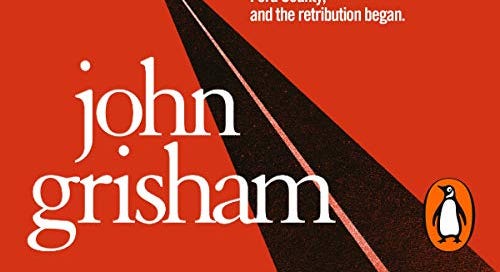“The Last Juror” by John Grisham
A novel about the American South and the unique Judicial system which governs it.
Crime permeates our collective consciousness like little else. The soft murmurs of warning as a beloved leaves the safety of home, a gentle reminder to call when one reaches one’s destination, the tucking of extra cash in a second wallet, and the gnawing anxiety about whether one has latched the main door all stem from fear or anticipation of a crime not yet committed.
And yet, with each passing year, most places on the globe become statistically safer than ever before. How does one reconcile this mismatch between reality and fear? That is a question for another day.
For now, let us savour the reality that crime makes for incredible fiction.
A Jury of one’s “Peers”
At the heart of this novel, as with most legal thrillers, is a criminal case that is tried in a court of law. In the United States, or at least within the legal framework in which Grisham sets this particular novel, the all-important decision of conviction sits not at the gavel of an experienced judge but within the decision-making consensus of a jury of one’s “peers”.
But who is to say who is an apt peer?
When one adds nuances of race and gender, class and education, not to mention crooked tactics of intimidation and bribery, is it even possible to attain an “unbiased” jury? To that one can add present-day social-media trials and it becomes increasingly difficult to digest the power that a jury may hold.
Neil deGrasse Tyson repeatedly alludes to the biases that plague memory and its influence on human choices like the jury system, and in this novel, I saw a pleasant yet damning application of the same.
Pigeon-holing Grisham
Most authors dread being pigeonholed- having a genre thrust onto them by publishers and promoters and then being expected to write only that kind of content. As such, the easy workaround is to set a work within the expected settings of a genre and then play with the plot which can bend ideas and permeate into other genres. Perhaps my favourite example of the same is Stephen King’s novel The Dead Zone which for all of its future-seeing, dog-beating political horror is essentially a love story.
Grisham achieves the same with this novel and exceptionally well.
For a legal thriller, there is a conspicuously limited amount of page-time given to courtrooms and the reader is instead treated to the sociopolitical makeup of Ford County where the novel is set. I thoroughly enjoyed this detour.
For instance, a part of the novel where the protagonist, who is a young liberal newspaper editor, goes about visiting each and every one of the county’s numerous churches adds more flavour to the novel than certain parts of the trial scene.
Thus, do not read this novel solely for its legal aspects. Movies like 12 Angry Men and novels like To Kill a Mockingbird will arguably serve that purpose better.
Do read this novel for much more insight into American culture, you will not be the last reader to do so, I’m sure.
Lastly, if you liked what you read above, this novel is one of the main pieces of content I analyze in a certificate course I co-offer. Do check it out and consider joining if I have aroused your curiosity on the matter. Follow this newsletter and share and comment. Until next time, keep reading.



